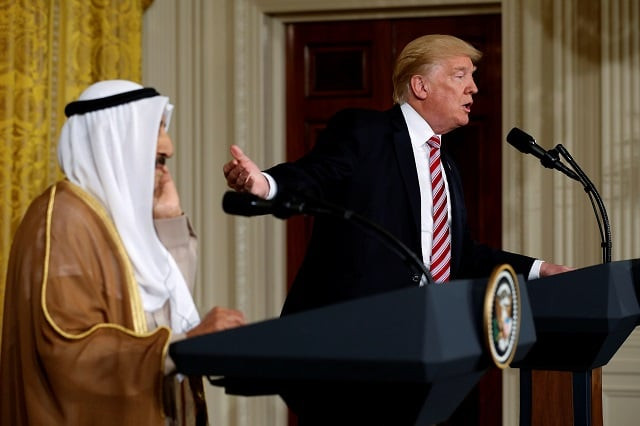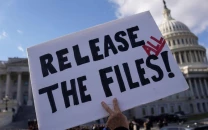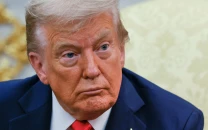Trump offers to mediate talks on Qatar crisis
The Saudi-led bloc responded and showed no signs of backing down as it questioned the Kuwaiti emir's statement

Kuwait's Emir Sabah Al-Ahmad Al-Jaber Al-Sabah (L) and U.S. President Donald Trump hold a news conference after their meetings at the White House in Washington, U.S. September 7, 2017
PHOTO: REUTERS
"If I can help mediate between Qatar and, in particular, the UAE and Saudi Arabia, I would be willing to do so, and I think you would have a deal worked out very quickly," Trump said at a joint news conference with Kuwaiti Emir Sheikh Sabah al-Ahmad al-Jaber al-Sabah. Saudi Arabia, the UAE, Egypt and Bahrain cut diplomatic and trade links with Qatar on June 5, suspending air and shipping routes with the world's biggest exporter of liquefied natural gas, which is home to the region's biggest US military base.
Arab states demand Qatar closes Jazeera, cuts back ties to Iran
The nations say Doha supports regional foe Iran and militants, charges Qatar's leaders deny. Kuwait has been trying to mediate the dispute. "What is important is that we have stopped any military action," Sheikh Sabah said. While both sides in the dispute have ruled out the use of armed force, some ordinary Qataris have said they worry about the possibility of military action, given the ferocity of the criticism their country has received from media in the four Arab states.
Sheikh Sabah said he had received a letter from Qatar that expressed willingness to discuss a list of 13 demands from its neighbors. "We know that not all of these 13 demands are acceptable," Sheikh Sabah said, referring specifically to issues that affected Qatari sovereignty. "A great part of them will be resolved," he said. For its part, Doha said Trump had called Emir Sheikh Tamim bin Hamad al-Thani to discuss mediation efforts.
Qatari Foreign Minister Sheikh Mohammed bin Abdulrahman al Thani told Al Jazeera TV that any mediation had to come "without conditions", reiterating that Doha would not negotiate while transport links with neighbours remained cut. The Arab powers responded with a joint statement accusing Qatar of putting preconditions on negotiations which it said showed a lack of seriousness in resolving the dispute. The four countries reiterated an accusation that Qatar continued to finance terrorism and interfere in the internal affairs of other countries.
Qatari officials have repeatedly said the demands are so draconian that they suspect the four countries never seriously intended to negotiate them, and were instead seeing to hobble Doha's sovereignty. At the same time, they have said Qatar is interested in negotiating a fair and just solution to 'any legitimate issues' of concern to fellow Gulf Cooperation Council member states. The joint statement praised what the countries called Trump's firm assertion that the only way to resolve the crisis was by stopping the support and financing of terrorism "and his unwillingness to resolve the crisis unless this is achieved".
Germany calls for diplomacy to resolve Qatar crisis, end blockade
They expressed regret about the Kuwaiti emir's comment about stopping military intervention. "The military option was not and will not be (used) in any circumstance," the statement said.
Saudi-led bloc stays tough on Qatar despite Trump offer
In a statement early Friday, the Saudi-led bloc showed no signs of backing down as it questioned the Kuwaiti emir's statement that Qatar would be willing to accept their 13 demands. "Dialogue on the implementation of the demands should not be preceded by any conditions," they said in the joint statement carried by the state-run Saudi Press Agency.
The demands include shutting Doha-based broadcaster Al-Jazeera, closing a Turkish military base in the emirate and downgrading Qatari diplomatic ties with Iran. The bloc also voiced 'regret' about the Kuwaiti ruler's statement "on the success of mediation in stopping military intervention". Instead, the four Arab states stressed in their joint statement that "the military option has not been and will not be considered" under any circumstances.
They also criticised Qatari Foreign Minister Sheikh Mohammed bin Abdulrahman Al-Thani for comments he made after the meeting between Trump and the Kuwaiti emir. In remarks aired on the Al-Jazeera television network, Sheikh Mohammed rejected the Saudi-led bloc's 13 demands, saying they "attacked the sovereignty" of his country. "Setting preconditions for dialogue confirms Qatar's lack of seriousness in dialogue, combating and financing terrorism and interfering in the internal affairs of countries," the bloc said in its statement.
Qatar offers visa-free entry to 80 nationalities
The United States has given mixed signals on its policy to the Gulf crisis while Kuwait has emerged as a key mediator. Trump immediately expressed staunch support for Saudi Arabia after the Arab states announced sanctions against Qatar, but some other US officials including Secretary of State Rex Tillerson adopted a more measured tone. Riyadh and Doha are both key allies of the United States.
Trump chose Saudi Arabia for his first overseas visit as president in May, two weeks before the Gulf crisis erupted. Qatar is meanwhile home to a huge US air base, where the headquarters of Centcom - the regional command which leads operations against the Islamic State group - is based. Last month Qatari and US paratroopers held a joint training exercise which American officials said reinforced "the enduring military-to-military" partnership between the two countries.



















COMMENTS
Comments are moderated and generally will be posted if they are on-topic and not abusive.
For more information, please see our Comments FAQ